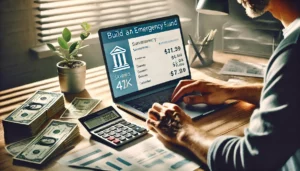
Unexpected expenses can hit like a ton of bricks. You know, you’re cruising along, thinking you’ve got your financial situation under control, and bam! Your car breaks down, or a medical emergency pops up. These moments can feel like the universe is playing a prank, but the financial strain is no joke.
Let’s face it—unplanned expenses aren’t just a minor inconvenience. They can significantly impact your financial stability. Think about it: one hefty bill can throw off your budget for months. Financial stress isn’t just about money; it can affect your well-being and peace of mind. The ripple effects can touch every part of your life, from your mental health to your relationships.
Consider this: Jane, a friend of mine, thought she was doing pretty well. She had a budget and stuck to it. But when her water heater decided to quit in the middle of winter, she wasn’t prepared. She had to dip into her savings and ended up cutting back on essentials just to manage. Stories like Jane’s aren’t rare—they’re a reminder of why it’s crucial to prepare for the unexpected.
Wondering what kind of expenses we’re talking about here? It’s the stuff no one likes to think about. Car repairs, medical bills, sudden home repairs, or even an unexpected job loss. These aren’t just annoying; they can be financially crippling if you’re not ready for them.
Beyond the dollars and cents, there’s a psychological toll. The stress of not being able to cover these surprise expenses can lead to anxiety, sleep issues, and even strain your relationships. Planning ahead isn’t just about money; it’s about peace of mind and being able to handle life’s curveballs without losing your cool.
Building an Emergency Fund: Your Financial Safety Net
An emergency fund is basically your financial life jacket. It’s not about if you’ll need it, but when. Emergencies will come up. But having a dedicated stash of cash can mean the difference between a minor setback and a full-blown crisis.
First things first, what exactly is an emergency fund? Simply put, it’s a reserved amount of money set aside specifically for financial surprises. Think medical emergencies, sudden car repairs, or even unexpected job loss. This fund helps you tackle these problems without having to disrupt your regular budget or go into debt.
So how do you start building this financial safety net? The key is to begin gradually. Start with a small, manageable goal, like saving $500 to $1,000. Over time, aim to have three to six months of living expenses saved up. This way, you’re covered for more significant issues that could arise.
Automating your savings can be a game-changer. Set up a direct deposit from your paycheck into a separate savings account. This way, you won’t even miss the money. It’s like setting it and forgetting it. The smaller, regular contributions will add up faster than you might think.
Wondering how much you should save? It depends on your personal circumstances. If you’ve got dependents or a variable income, you might want a larger cushion. On the other hand, if you’ve got a stable job and few financial obligations, a smaller fund might suffice. The critical part is to tailor it to your needs.
Maintaining the fund is equally essential. This isn’t a ‘set it and forget it’ situation forever. Regularly review your fund and make adjustments as your life changes. Did you get a raise or pay off a debt? Great! Consider boosting your emergency fund accordingly.
The goal is to make sure this fund is easily accessible but not too easy to dip into for non-emergencies. A separate high-yield savings account can offer a balance of accessibility and added interest.
Effective Budgeting Strategies to Manage Unexpected Costs
The 50/30/20 rule is a classic budgeting framework that keeps things simple and flexible. Allocate 50% of your income to needs, 30% to wants, and 20% to savings and debt repayment. This way, you’re making sure savings and debt reduction are part of the plan from the get-go.
Another smart move is to build a buffer into your monthly budget. This isn’t your emergency fund, but a small extra amount set aside each month for those little unexpected costs that pop up outta nowhere. It’s like having a mini emergency fund within your monthly budget.
In today’s digital age, budgeting apps and tools can be a lifesaver. These handy tools help you track your spending, set financial goals, and give you a clear snapshot of where your money is going. Apps like Mint, YNAB (You Need A Budget), or even simple spreadsheet templates can make a huge difference.
When life throws a financial curveball, adjusting your budget in real-time is crucial. Maybe you need to cut back on dining out or scale down on non-essentials. Flexibility in your budgeting habits can help you navigate unexpected expenses without going into a financial tailspin.
Creating a detailed budget at the start of each month gives you a roadmap, but don’t be afraid to make changes as you go. Life isn’t static, and neither should your budget be. Regularly review your spending, reassess your financial goals, and tweak where necessary to keep everything on track.
Smart Financial Practices to Minimize Surprise Expenses
What if you could sidestep some of those unexpected costs altogether? Proactive maintenance is your first line of defense. Regularly maintaining your car and home can prevent costly repairs down the line. Simple actions like routine oil changes or yearly gutter cleanings might seem like chores, but they can save you a fortune over time.
Insurance is another critical layer of protection. Health, auto, renters, or homeowners insurance—these policies can cover major unexpected costs, making them more manageable. It’s crucial to choose the right coverage and keep your policies up to date. The peace of mind that comes with knowing you’re protected is priceless.
Ever heard of sinking funds? These are specific savings set aside for anticipated expenses that aren’t regular but are expected. Think annual car registration fees, holiday spending, or a new appliance. By planning for these predictable expenses, you’ll keep your primary budget and emergency fund intact.
Past experiences can be powerful teachers. Take a look at any recent financial hiccups and consider how you can better prepare for them in the future. Maybe you had an unexpected medical bill or a sudden job loss. Use these experiences to tweak your financial plan, so you’re better prepared next time.

It’s so true how unexpected expenses can throw us completely off balance. I appreciate the emphasis on both the financial and emotional impact. It’s something that people don’t always talk about. Your tips on building an emergency fund are spot on, especially starting with small, manageable goals. Automating savings is a game-changer! I also love the idea of having a mini-buffer in the monthly budget; it’s like a little cushion for life’s surprises. Definitely going to take a closer look at my insurance policies and maybe even set up a sinking fund for those expected-but-forgotten expenses!